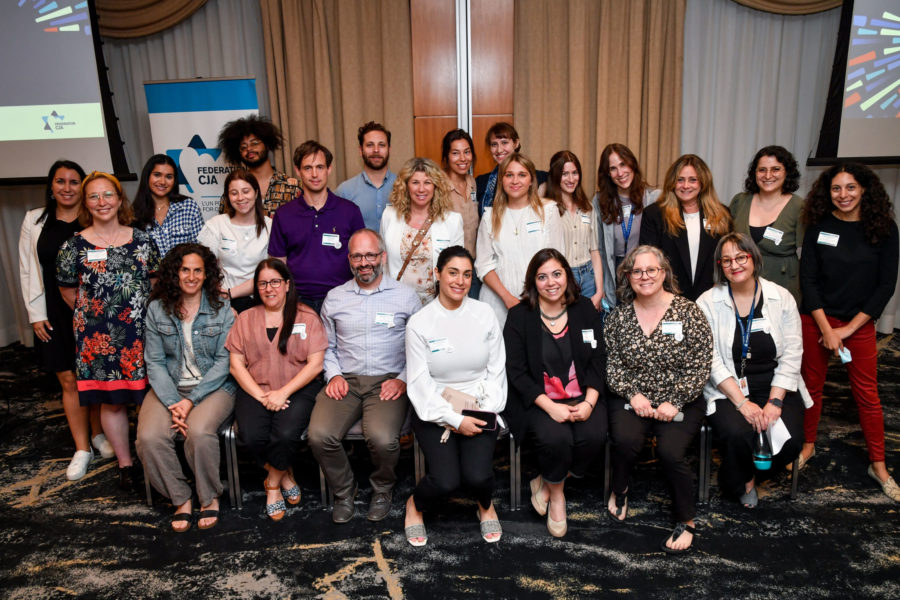Challenge
Federation CJA (FCJA) was in the midst of a strategic planning process when it recognized it lacked a full understanding of what the Jewish community’s wants and needs were—and why people were or were not opting into programs. CJA has a relationship with Rosov Consulting from previous work developing a Theory of Change, Key Performance Indicators, and a governance document for its Passport to Jewish Life Initiative.
In late 2019, FCJA, with support from the Jewish Community Foundation of Montreal, engaged Rosov Consulting again to help community stakeholders better understand the interests and desires of Jewish-identified and Jewish-adjacent people in the greater Montreal Jewish community. FCJA in particular wanted to explore initiatives designed to create systemic change, as opposed to only analyzing certain programs. Specifically, FCJA sought to learn:
- Which Jewish programming, services, opportunities, or resources community members want, whether they are currently available or not.
- How various subpopulations of the community differ in their needs and interests.
- Why some community members don’t opt in to programming and services within the Jewish community.
Approach
Working closely with FCJA, Rosov Consulting designed a study to learn about the Jewish educational, social, religious, and cultural experiences and interests of a broad array of people across the community. To this end, after meeting with agency professionals and lay leaders, Rosov initiated a community listening phase of the study to gain a deep understanding of the people and places that make up Montreal Jewish life. The listening tour helped Rosov Consulting identify key groups of interest around which to form focus groups. Conversations in those focus groups–in addition to working very collaboratively with the Federation team–then helped inform Rosov’s development of a survey that provided a rich portrait of community members’ interests and desires The Passport to Jewish Life Funders Collaborative also had particular interest in learning about interfaith couples and families. So, to combine efforts, interfaith couples received an additional set of questions.
For the survey portion of the study, over 2,470 individuals responded offering insights about their Jewish education, engagement, and social service interests. These individuals at different times had participated or engaged in some way, shape, or form with the array of institutions and programs in the Montreal Jewish community. Rosov Consulting’s analysis drilled into different population segments to better understand the unique needs of certain groups in the community.
For the qualitative portion of the study, focus groups and interviews with 160 people paid special attention to specific groups of interest to FCJA leadership, including Francophone, Haredi, LBGTQ+, Interfaith, and Russian-Speaking Jews. Focus groups included participants with a range of levels of engagement in Jewish communal activities. Voices of agency and synagogue professionals and volunteers, as well as members of FCJA’s Board of Directors, were also included in the study.
Results

As a result of the needs assessment, community stakeholders and leaders have developed new initiatives that meet the needs of more community members and keep them engaged. Community leaders now know what different segments of the community feel are important and have data to inform strategic decisions around funding, grantmaking, and grant innovation. The assessment showed that community members prioritize connection, inclusion, accessibility, and belonging to feel a part of a unified and engaged community. And FCJA’s strategic plan reflects how this priority connects with strengthening community members’ Jewish identity and levels of engagement.
FCJA saw a need from the study to prioritize cultural organizations and programming, increase diversity in Jewish life, and better support French education. They then embarked on a listening tour around culture and identity to hear what programs people might want in these areas. FCJA also has used the study to ground conversations about resources and budget allocations in data to respond to the greatest needs of the community. The study has been especially helpful in making the case for French language offerings and the value of French language in Montreal.
Since the study revealed important patterns about community members’ interests and desires and some of the common challenges and barriers to their participation in Jewish community life, it has been an excellent tool to identify baseline areas on which to collect further data. These efforts are part of FCJA’s new evidence-based approach to its decision making. Following the assessment, FCJA launched new initiatives around interfaith inclusion and professional development, and created a smart technology platform to drive more engagement in Jewish life.
Key learnings from the assessment that informed these new efforts include the following:
- Cultural programming tends to be of highest interest to all, but important nuances exist across a variety of subgroups that highlight the diversity of the community.
- 50% of interfaith couples want more opportunities to connect with others like them and feel the community doesn’t offer enough opportunities.
- A significant portion of the study sample are interested in becoming more engaged than they currently are in Jewish communal life, yet 64% of respondents experience some form of barrier to participation (cost in particular).
- The community’s diversity is both a blessing and a challenge. Fostering cultures of inclusion and belonging across such diversity might be the gateway to greater feelings of connection and ultimately engagement and participation.
The needs assessment continues to be used as a reference and resource to understand what the community wants. Now, FCJA is engaging with stakeholders again to look at the impact of these efforts and to determine next steps to continue to increase engagement in local Jewish life.


